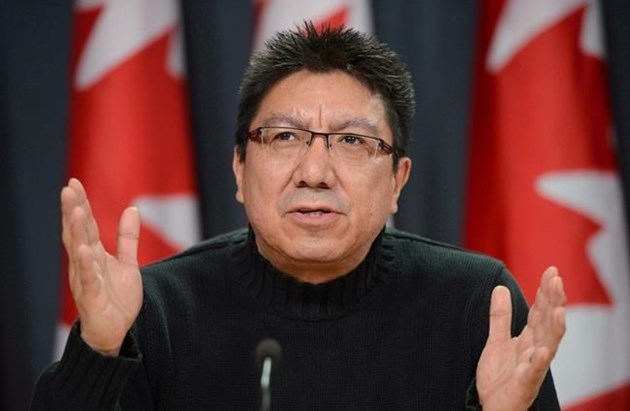EDITOR’S NOTE: This article originally appeared on The Trillium, a Village Media website devoted to covering provincial politics at Queen’s Park.
Two prominent First Nations leaders are criticizing the Ford government's plan to implement "Indigenous-led economic zones" with Bill 5.
Chiefs of Ontario Regional Chief Abram Benedict and Nishnawbe Aski Nation Grand Chief Alvin Fiddler said separately on Thursday that the government's announcement that it would consult with "Indigenous partners" over the summer on how to use the regulation-making power granted by the bill to create "Indigenous-led economic zones" in Ontario does not ease their concerns about the legislation.
The bill has come under sustained criticism from Indigenous leaders, who have predicted it will lead to court challenges and a resurgence of the Idle No More movement's protests and blockades should the government pass it unchanged. They have objected to the government's failure to consult with Indigenous rights holders prior to tabling the bill, which could pass as soon as next week, as well as its potential impact on treaty and Aboriginal rights, the environment, endangered species and important sites such as burial grounds.
Bill 5 would give the provincial cabinet the power to designate an area a “special economic zone,” and then exempt selected proponents and projects from requirements under any provincial law or regulation, including bylaws of municipalities and local boards, that would otherwise apply.
Federal laws, like the Criminal Code and Charter, and treaty rights, cannot be waived, however.
On Wednesday, the Ford government announced its intention to use the legislation to create "Indigenous-led" zones, and to amend the bill to recognize Aboriginal and treaty rights.
"Our position is that it's just way too late in the process," Fiddler told reporters Thursday. "It's an insult to our leadership for the government to now come back to us with some proposed amendments.
Benedict told The Trillium that the government proceeded with its public pivot to Indigenous-led economic zones in the same manner it did with the legislation: without first consulting.
"They say that this is what we think is going to be the best for First Nations and the rights holders," Benedict said. "There's been no conversation with communities around the ability to develop a First Nation economic zone, and so it's just the same approach that we've had the problem with from the beginning."
Indigenous Affairs Minister Greg Rickford signalled Wednesday that he wanted to consult with Indigenous people through the grand chiefs after the bill passes.
"The duty to consult starts when political leadership sits down with Indigenous leaders from across the province as their grand chiefs, etc., represent them, and then proceed into regional parts of Ontario to make sure that Bill 5 is understood as an opportunity, an opportunity to build legacy infrastructure, to advance projects that are as much in the interest of First Nations as they are to the province of Ontario," he said in question period.
Both Benedict and Fiddler rejected that approach.
Benedict said that community leadership should be consulted, and that there are concerns about consulting on the regulations alone — which can easily be influenced by the cabinet of the day.
Fiddler noted that the government has given no details on the Indigenous-led economic zones plan so far.
"We don't even know what that means, and they haven't explained what they mean when they say that," Fiddler said. "And so it's just, to me, trying to do things on the fly, to try to appease the Indigenous leadership — and it's not working."
Benedict, meanwhile, noted that even if the government decides to proceed with an Indigenous-led economic zone in the Ring of Fire, and consult with the First Nations in those areas, the scope of the bill is much broader.
"The government has made this legislation so broad and very sweeping that they can build whatever they want in any part of Ontario," he said.
Ontario's bill also proposes to speed up approvals for mining projects through a “one-window” approach, ends an environmental assessment for a controversial dump expansion in Dresden, Ont., replaces the province's Endangered Species Act with legislation that environmental groups argue offers far weaker protections, and empowers cabinet to exempt projects from archaeological assessment requirements — which Indigenous leaders have warned puts sacred sites at risk.
Both leaders said the government has mishandled the process so far, harming any efforts it's making to move forward.
"I think that this is why process is extremely important because it's sometimes reactionary, where people don't like the process and therefore don't want to talk about the benefits," said Benedict.
Meanwhile, both Fiddler and Benedict have expressed caution about forthcoming legislation from the federal Liberal government. At a recent press conference, Fiddler said he'd heard that Mark Carney's federal Liberal government was considering similar legislation to Ontario's Bill 5, and he warned that "this is not how you want to start your mandate as prime minister."
Benedict said the federal government has written to national and regional Indigenous organizations with its intention of introducing legislation to speed up new projects.
"I unfortunately feel that we're going to be having the same argument with the federal government around the process, and that they should be having a more fulsome conversation with rights holders about what the true intention is of this legislation, and so that a constructive way forward can be agreed upon, so that everybody is working in the same direction and not working against each other over rights infringement and process," he said.
The Globe and Mail has reported that “One Canadian Economy” legislation already shared with some Indigenous leaders will be a significant topic of conversation at next week's first ministers' meeting in Saskatoon, and will be introduced shortly afterwards. It would allow the federal cabinet "to make regulations to modify federal regulatory requirements for all projects determined to be in the country’s national interest," the report said.




